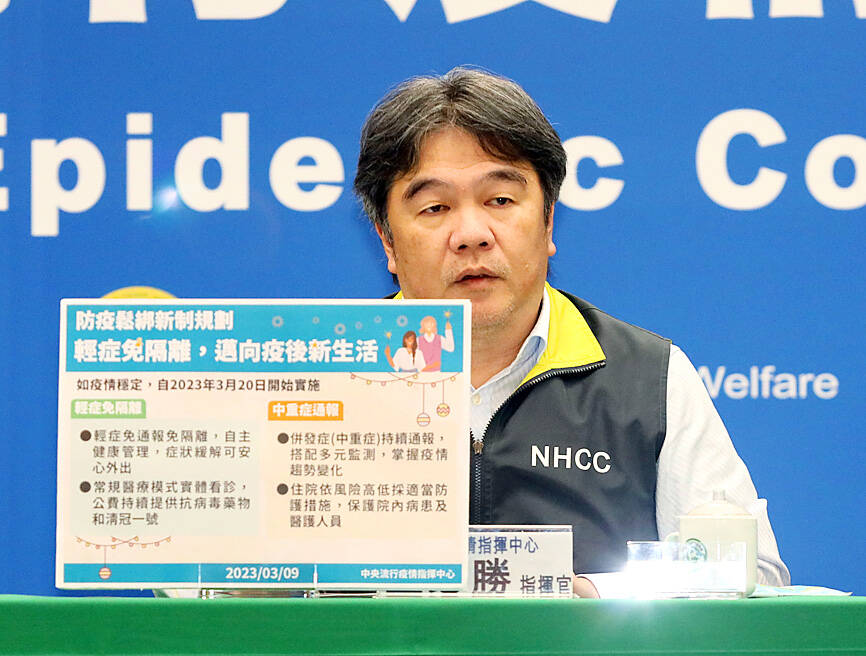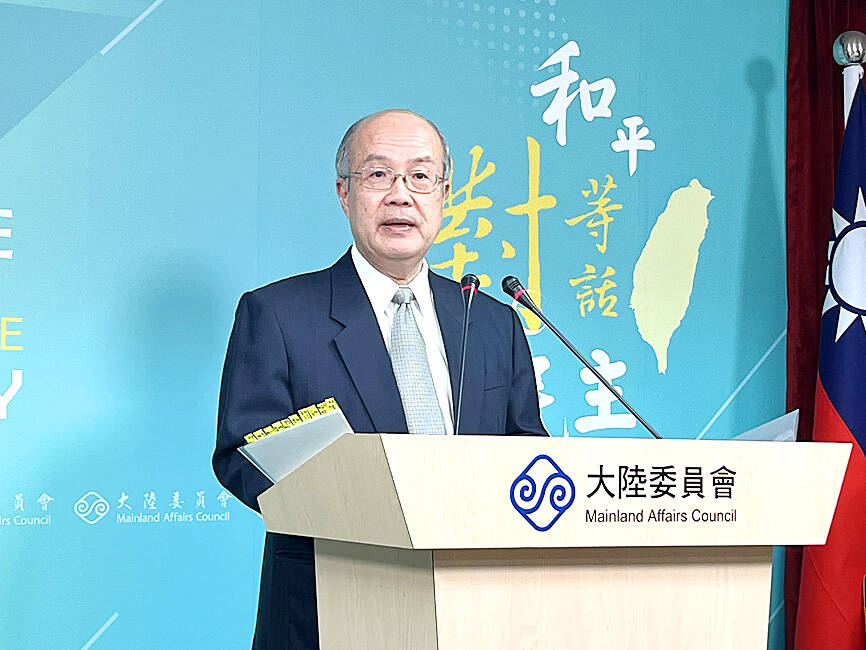Starting from March 20, mild COVID-19 cases are no longer to be required to quarantine, the Central Epidemic Command Center (CECC) said yesterday, announcing the end of a policy that has been in place for more than three years.
Mandatory quarantine has been in effect since Jan. 15, 2020, when COVID-19 was designated a category 3 communicable disease.
The CECC said that as the COVID-19 situation in Taiwan has been easing, the reporting of mild or asymptomatic cases, as well as mandatory five-day quarantine for infected people, would be phased out from March 20.

Photo: CNA
People who test positive in a rapid test would no longer have to confirm their results via a telemedicine appointment and would be asked to monitor their health for 10 days, said Centers for Disease Control Deputy Director-General Philip Lo (羅一鈞), who is also the CECC’s spokesperson.
Symptomatic COVID-19 cases would be encouraged — but not required — to stay at home until their symptoms ease, or wear a mask at all times if they go out, Lo said.
The Ministry of Education said it would continue to advise students and teachers not to attend classes in person for five days after testing positive for COVID-19.

Photo: CNA
In terms of reporting, Lo said that only moderate-to-severe COVID-19 cases — defined as those that require hospitalization — would be reported to the government after March 20.
The rules that require the special handling and expedited cremation of deceased COVID-19 patients would also be lifted on that date, the CECC said.
The number of COVID-19 cases have been dropping steadily over the past five weeks and average at about 10,600 per day, CECC data showed.
Separately, the government has agreed to resume regular flights to 10 more Chinese airports, adding that airlines can today begin applying for regular flights to the destinations.
Prior to the announcement, China had limited cross-strait flights to Shanghai Pudong and Hongqiao International Airports, Chengdu Shuangliu International Airport, Beijing Capital International Airport and Xiamen Gaoqi International Airport to contain a COVID-19 outbreak in that country.
Last month, China’s Taiwan Affairs Office (TAO) urged the government to quickly restore cross-strait direct flights between 16 Chinese destinations: Guangzhou, Shenzhen, Nanjing, Wuxi, Hangzhou, Ningbo, Wuhan, Fuzhou, Hefei, Chongqing, Changsha, Zhengzhou, Haikou, Xian, Shenyang and Harbin.
“We have decided to resume regular flight services to and from 10 Chinese airports after taking into account their proximity to areas densely populated by Taiwanese businesspeople and the balance in flights dispatched from Taiwan and China, as well as capacities of Taiwanese and Chinese carriers,” Mainland Affairs Council (MAC) Deputy Minister Jan Jyh-horng(詹志宏) said.
The 10 destinations are Shenzhen, Guangzhou, Nanjing, Chongqing, Hangzhou, Fuzhou, Qingdao, Wuhan, Ningbo and Zhengzhou.
Charter flight services would be allowed to 13 other Chinese destinations, due to smaller demand: Shenyang, Wuxi, Haikou, Changsha, Xian, Jinan, Hefei, Nanchang, Tianjin, Wenzhou, Dalian, Guilin and Xuzhou, he said.
The number of cross-strait flights would be initially kept at 209 — 110 from Taiwan and 99 from China — Jan said.
Details of dispatching cross-strait charter flights would be announced by the Ministry of Transportation and Communications.
President Tsai Ing-wen (蔡英文) and Premier Chen Chien-jen (陳建仁) have supported orderly and healthy exchanges of all disciplines between Taiwan and China after both countries reopened their borders, Jan said.
Officials at the MAC, the transportation ministry and the Ministry of Health and Welfare have evaluated a wide range of factors before finalizing the plan to increase cross-strait flights, including travelers’ demands, possible health risks, cross-strait relations and other supporting measures, Jan said.
“We have also tried our best to show goodwill by incorporating Beijing’s suggestions in our considerations,” he said. “We also hope that reinstating the cross-strait flights will facilitate positive interactions between Taiwan and China.”
Jan said the MAC has agreed to allow Taiwanese returning home for the Tomb Sweeping long weekend next month to transit through the “small three links” connecting Kinmen and Lienchiang counties and China.
The timing to resume more cross-strait flights has nothing to do with Tsai’s planned meeting with US House of Representatives Speaker Kevin McCarthy next month when she transits through the US to visit Taiwan’s allies in Central America, he said.

DEFENDING DEMOCRACY: Taiwan shares the same values as those that fought in WWII, and nations must unite to halt the expansion of a new authoritarian bloc, Lai said The government yesterday held a commemoration ceremony for Victory in Europe (V-E) Day, joining the rest of the world for the first time to mark the anniversary of the end of World War II in Europe. Taiwan honoring V-E Day signifies “our growing connections with the international community,” President William Lai (賴清德) said at a reception in Taipei on the 80th anniversary of V-E Day. One of the major lessons of World War II is that “authoritarianism and aggression lead only to slaughter, tragedy and greater inequality,” Lai said. Even more importantly, the war also taught people that “those who cherish peace cannot

STEADFAST FRIEND: The bills encourage increased Taiwan-US engagement and address China’s distortion of UN Resolution 2758 to isolate Taiwan internationally The Presidential Office yesterday thanked the US House of Representatives for unanimously passing two Taiwan-related bills highlighting its solid support for Taiwan’s democracy and global participation, and for deepening bilateral relations. One of the bills, the Taiwan Assurance Implementation Act, requires the US Department of State to periodically review its guidelines for engagement with Taiwan, and report to the US Congress on the guidelines and plans to lift self-imposed limitations on US-Taiwan engagement. The other bill is the Taiwan International Solidarity Act, which clarifies that UN Resolution 2758 does not address the issue of the representation of Taiwan or its people in

Taiwanese Olympic badminton men’s doubles gold medalist Wang Chi-lin (王齊麟) and his new partner, Chiu Hsiang-chieh (邱相榤), clinched the men’s doubles title at the Yonex Taipei Open yesterday, becoming the second Taiwanese team to win a title in the tournament. Ranked 19th in the world, the Taiwanese duo defeated Kang Min-hyuk and Ki Dong-ju of South Korea 21-18, 21-15 in a pulsating 43-minute final to clinch their first doubles title after teaming up last year. Wang, the men’s doubles gold medalist at the 2020 and 2024 Olympics, partnered with Chiu in August last year after the retirement of his teammate Lee Yang

The Philippines yesterday criticized a “high-risk” maneuver by a Chinese vessel near the disputed Scarborough Shoal (Huangyan Island, 黃岩島) in a rare incident involving warships from the two navies. The Scarborough Shoal — a triangular chain of reefs and rocks in the contested South China Sea — has been a flash point between the countries since China seized it from the Philippines in 2012. Taiwan also claims the shoal. Monday’s encounter took place approximately 11.8 nautical miles (22km) southeast” of the Scarborough Shoal, the Philippine military said, during ongoing US-Philippine military exercises that Beijing has criticized as destabilizing. “The Chinese frigate BN 554 was